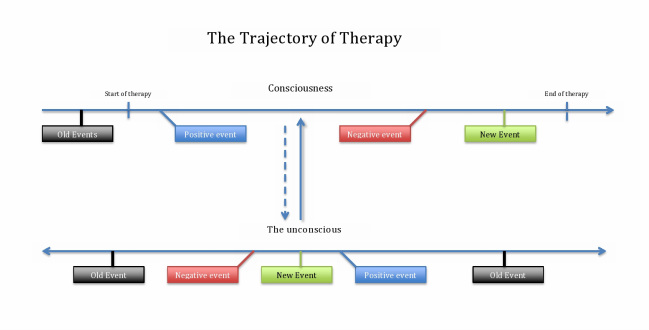|
“How does therapy move forward?” and “why doesn't it seem to sometimes?” Nearly everyone who begins therapy will come up against both of these questions. Both questions are potentially very complicated to answer. Therefore, it will be the place of this article to only touch upon a basic way of illustrating some of the more general components of the processes involved. Then some of the complications people may confront will be introduced. As long as we keep it basic I believe that you will be able overlay or insert your personal experiences and then maybe recognize and prevent the stoppages and encourage the forward progressions.
The accompanying graph has two horizontal lines, which are labeled “Consciousness” and “The unconscious.” These can be thought of as the individual’s ability to be aware, i.e. conscious, and the reality that sometimes we are not so aware of some things, i.e. the unconscious. An example of how we are not aware or are unconscious of something is simply your name. Your name remains unconscious until someone calls you by it or you see it written or as you are possibly thinking about it just now. So, back to the graph: The top line labeled “Consciousness” can be thought of as the materially physical and the temporal, time-dependent aspect. It is the part that you experience in you daily life and the part that your immediate awareness recognizes. The past, present and future are all on this line and you recall it based on its chronological order. The “Start of Therapy” could easily be the “start of the day” or the “start of the workday,” it represents the first session of therapy. Therapy continues down this line with positive, negative or “new” events. Therapy, however, does not move forward as easily and obviously as would your workday or any other day of your life. Therapy is, or at least should be, a very different experience from your normal daily life. The main reason why therapy is vastly different is the therapist should be looking for what comes out of your unconscious. This is unlike the interactions you will have with other people in your daily life. Normally people are just concerned with the “face-value” of what you are saying and how it effects them: “You want a Kit-Kat,” “Well I like Snickers.” The therapist is listening for your likes and dislikes, for sure, but they are not then comparing them to their own. The therapist is paying attention to your unconscious desire to talk about candy bars instead of the original reason you started therapy. Now back to “why does therapy seem to stop?” Positive and negative events occur all throughout therapy. One day therapy seems to click and you really feel like “I get this and I like it,” but then the next week there seems to be something off and for that matter you don’t even recall any of the positive events from the last week. A very simple way of illustrating this is the dynamic between the two lines on the graph. It is very easy to be happy or fulfilled by therapy on a good day where you experience what seems to be a positive movement forward; however, when that event is over, and for that matter even when a negative event is over, the idea of the event moves from your consciousness to the unconscious. Now the trick is that once it is in the unconscious there is no particular temporal placement for it and it is not easily recalled. The positive or negative events are both moved into the unconscious and are held there with all of the other events that have occurred in your lifetime waiting for a reason to be recalled consciously or being recalled unconsciously or unexpectedly because there was an associated event, similar to when your name is called out to you. The unconscious does not “discriminate” what goes in or what comes out and does not therefore “stop” therapy. What will stop therapy is the lack of communication between the therapist and yourself. The unconscious is always communicating to your consciousness. It is not always communicating in the language that you recognize. Why were you taking about candy bars again? It is the place of the therapist, their skill and experience, to build the relationship and rapport between them self and yourself, that is the communication between you and the therapist is model for the communication between you and your unconscious. This constant communication between yourself and the therapist mimics your unconscious and consciousness communication and will keep the therapy moving forward. By Mathew Quaschnick
3 Comments
Dupont Circler
6/22/2021 06:28:45 pm
Very helpful in seeing what is the "therapy relationship" suppose to be, certainly there is a societal idea that therapy is transactional, you input in and output something. But in viewing therapy as how one is communicating with the unconscious is helpful in for me feeling less socially awkward about "what is going on."
Reply
Leave a Reply. |
UPTOWN THERAPY MPLSEdited and composed by Mathew Quaschnick
Sort articles by clicking below on ARCHIVES or CATEGORIES.
MENTAL HEALTH THERAPY
LOCATION AND HOURS:
1406 West Lake St. #204 Minneapolis, MN 55408
Monday - Friday: 9-5 PM with limited evening appointments
Archives
March 2017
Categories
All
|
|
Uptown Therapy is wonderful. I have benefited greatly these past 8 months and am sure to continue. |



 RSS Feed
RSS Feed
